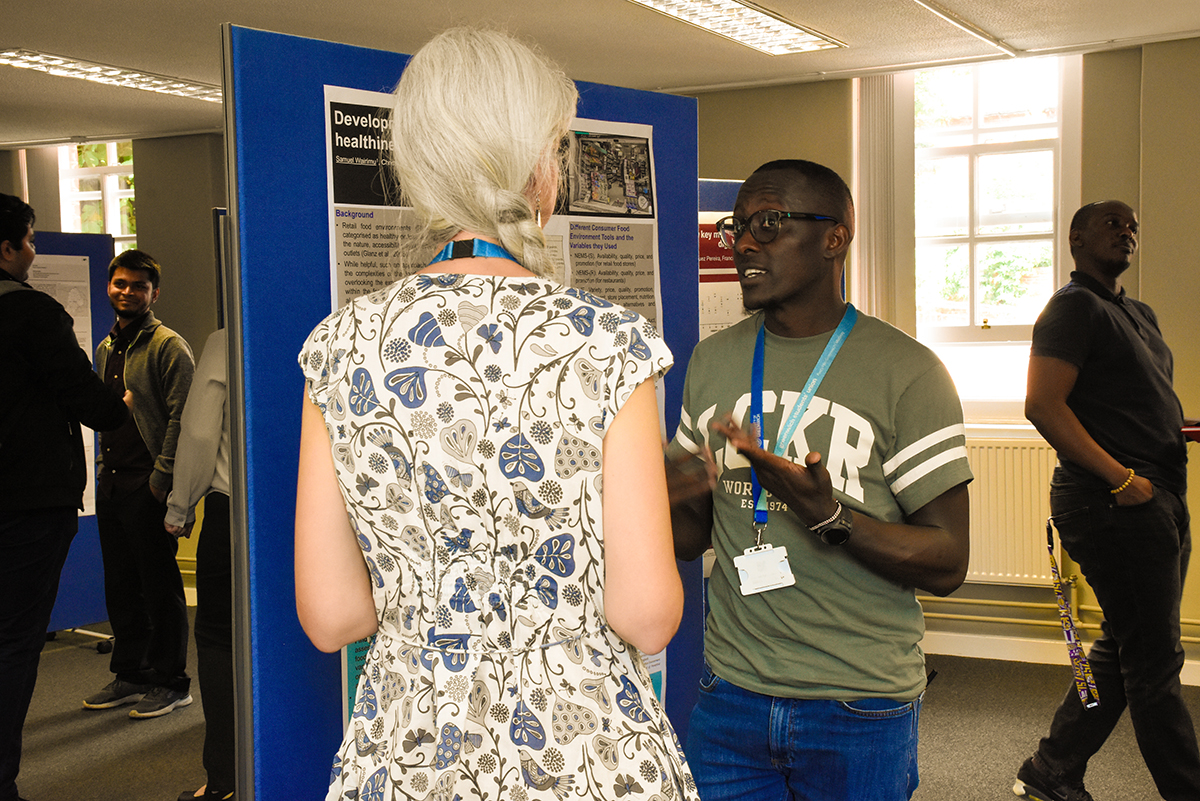
NRI came alive as cutting-edge research left lab and field and took centre stage at the annual Natural Resources Institute Postgraduate Society (NRIPS) symposium on 28 June. 34 students joined their peers, supervisors and other members of the university staff for a lively showcase of the boundless creativity and intellectual curiosity driving the next generation of scholars at NRI.
Students at various stages of their PhDs discussed a captivating tapestry of diverse research pursuits spanning the social sciences, natural sciences, engineering, and the arts. From unravelling the biomechanics of the human body to developing innovative pest control methods, the students offered a glimpse into the cutting edge of scientific inquiry.
In her opening remarks, NRI Director, Professor Sheryl Hendriks drew on her career as a food systems researcher to illustrate the complexity and interconnectedness of the challenges facing the world today. She reflected on the humbling realisation that food and nutrition security are in many respects in a worse condition than when she started doing research. While this could be dispiriting, she encouraged the students not to give up. ‘The world is increasingly complex with several interconnected elements. Do not lose the ambition to change the world’, she said. Professor Hendriks also emphasised the need for open-mindedness, trans-disciplinarity and the will to look beyond their fields as students conduct research in today’s complex settings. ‘You have to expand your views because when you get to your conclusions, it’s not going to help to be very specific about your particular topic. You are going to have to apply it to everyday life and to the things that government, policymakers and the public are interested in’, she advised.
The symposium, running for the 8th year in succession, was themed ‘Sustainable Futures: Interdisciplinary Approaches to Global Challenges’ reflecting the kind of research done at NRI and the spirit of the presentations at the event.
First-year PhDs gave ‘turbo-talks’ – three-minute presentations about their research topics, plans and early work on their projects. The wide range of topics included developing technologies to control invasive pests, understanding the ecology of problematic weeds, investigating the impacts of nutritional supplements, and using machine learning and big data to improve visual quality inspection of products in manufacturing processes.
control invasive pests, understanding the ecology of problematic weeds, investigating the impacts of nutritional supplements, and using machine learning and big data to improve visual quality inspection of products in manufacturing processes.
Students in their second year presented posters on research areas including nutrient uptake and yield gain analysis in wheat and developing tools to assess the healthiness of retail food outlets. Other students are exploring options to improve cellular models used to study brain disorders and using hoverflies for commercial fruit pollination among other topics.
Third-year students gave presentations on topics in food safety, conflict-sensitive approaches for climate adaptation, bacterial ecology, dissecting the debate around meat production in the wider climate change context, and developing better tools to detect fungal viruses (mycoviruses).
To encourage more participation and inspire quality dissemination of research results, students with outstanding presentations were recognised. Alexandros Anagnostou (Functional Capacity and Health Status in Young and Older Physically Active Adults ), Safinatu Ameen (Hoverfly Use for Pollination of Commercial Soft Fruit) and Hope Okon (Community Ecology of Bacterial Flora on Pig Farms and the Role of Rodent Reservoirs) were awarded prizes for excellent presentations in the first, second and third-year PhD categories respectively.
Beyond exchanging knowledge and ideas, the symposium was an excellent opportunity to showcase NRI’s broad-based, cross-disciplinary research aiming to transform lives and build a more sustainable future for all.
The Natural Resources Institute Postgraduate Society

NRIPS was created in February 2015 and is run by postgraduate students with the aim of enriching their academic, social, and intellectual interests. Members meet monthly to discuss topics of interest, such as publishing academic papers, research methods, and post-PhD career options.
They organise a range of social events, from 'potluck' dinners to bowling, ice skating, and movie nights, to celebrate members' academic and personal milestones. In addition to social and celebratory gatherings, NRIPS hosts events that provide opportunities for participants to reflect and share their experiences and lessons learned concerning different topics of importance.
Notably, on International Women's Day, NRIPS hosted a roundtable reflection and discussion where participants explored the profound impact of inclusion in the workplace. The discussion focused on the need to challenge discriminatory practices and ideologies, fostering inclusion through understanding, empathy and conscious efforts.
During the event, Professor Sheryl Hendriks, Director of NRI, reflected on the intricacies of inclusion and exclusion rooted in personal experiences and societal contexts. She acknowledged the complexity of inclusion strategies, noting that well-intentioned actions can inadvertently exclude others. Professor Hendriks observed that while inclusion is often discussed, exclusion is more prevalent and deeply ingrained and highlighted how social conditioning shapes individuals' behaviours leading to unconscious biases and exclusionary actions. She shared some personal experiences from her upbringing in apartheid South Africa, where exclusion was institutionalised and the transition to a post-apartheid society required a shift in mindset. She also drew parallels to contemporary issues such as COVID-19, highlighting how fear can drive exclusionary behaviours.
The roundtable acknowledged that deliberate effort and reflection are required to foster inclusivity, as it does not come naturally. Participants committed to do their part individually and collectively to make NRI a more inclusive environment for students and staff.

